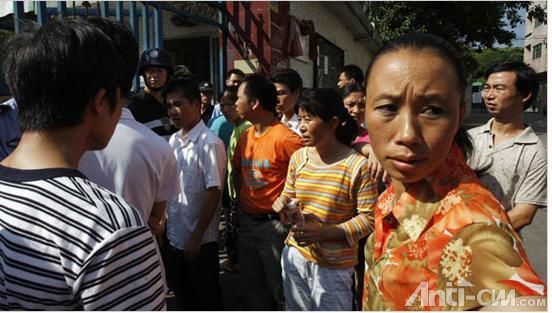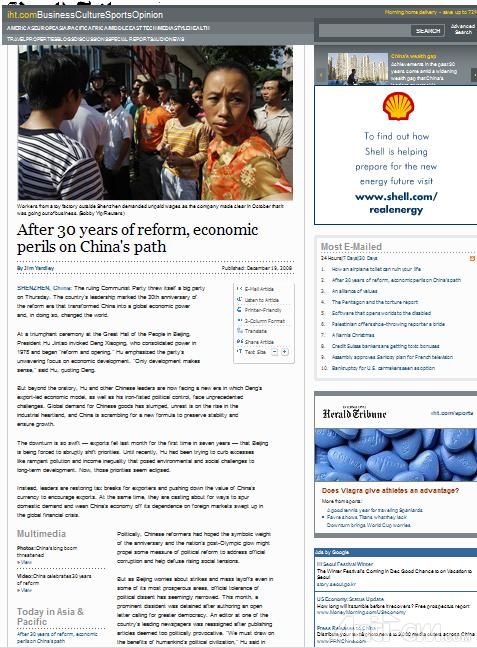|
|
【08.12.19 国际先驱报】30年改革后,中国道路遭遇经济危机
【原文标题】After 30 years of reform, economic perils on China's path
【中文标题】30年改革后,中国道路遭遇经济危机
【登载媒体】国际先驱报
【来源地址】http://www.iht.com/articles/2008/12/19/asia/19china.php?page=1
【译者】Gwen
【声明】本翻译供Anti-CNN使用,转载请注明译者及出处,谢谢!
【译文】

当某玩具公司10正式宣布破产时,工人们在深圳外索要拖欠工资
30年改革后,中国道路遭遇经济危机
中国深圳:共产主义执政党在周三开了一个大派对。这个国家的领导阶层纪念改革30周年,这场改革让中国转型为全球经济强国,也因此改变了世界。
在北京人民大会党这场欢庆的典礼上,胡锦涛主席提到了在1978年巩固自己的权力并开始了“改革开放”的邓小平,胡在会上引用他的话“只有发展才是硬道理”
但在除了这个演讲,现在胡和其它中国领导面临一个新的时代,这个时代里邓小平提出的出口经济模式以及铁拳政治管理遭到了着前所未有的挑战。中国商品的世界需求量已经下跌,不安的状态在工业中心地区蠢蠢欲动,中国现在正在急寻一个新的规则来维持稳定,保证增长。
经济低迷期来势如此迅速——七年内上月第一次出口出现下滑——以致于北京现在正被迫忽转重心。直到最近,胡锦涛一直在努力抵制极端情况如对长期发展造成环境和社会挑战的猖獗污染和收入的不平衡。现在这些重心都没落了。
取而代之的,领导们正为出口商减税和降低人民币价值来刺激出口。同时,他们也正在寻求刺激国内需求的方法和让中国经济逐渐停止依靠那些已经在全球金融危机中落败的外国市场。
政治上,中国改革者们希望周年会的象征意义和国家的后奥运光辉会促进对一些官员腐败的处和帮助缓解日益紧张的社会压力。
但是当北京担心甚至会出现在一些很繁荣的地区罢工和大规模的失业时,他对政见不一的官方宽容度好像很狭隘。 本月,一位突出的持不同政见者在向当局写信要求更大的民主后遭到了拘留。一位在中国一间大报社的编者在发表被认为太具政治煽动性的文章后被迫辞职了。“我们必须慢慢认识到人类政治文明的好处,”,据路透社报道,胡锦涛在周三的演讲中说到。“但是我们永远不会完全照搬西方政治系统模式”。
如果有地方能代表中国的改革时期的话,那就是深圳,一个由邓小平构想出到的城市——和一个现在因经济低迷期而苦恼的城市。周三的庆典定在了1978后的三中全会,在这个会上指定了邓小平为中国领导人并引入“改革开入”。两年后,邓小平指指定了临近香港在中国南海岸的一个沉睡的渔村,并认定他为中国第一个实行国外投资和出口制造业的“经济区”。现在,深圳是一个拥有超过1千万人口,上万家工厂的城市。
有一个在深圳处的工厂区——阜乔工业园区就是经济危机怎样影响整个地区的缩影。几个园区里的小工厂在最近几个月里已经倒闭。两个消费者为了运出货物来来这儿却只找到了一家空荡荡的工厂。同时,一些没有倒闭的工厂也是在挣扎维生。在一家大的印刷厂的工人们说厂里已经停止雇用新的员工了,并且许多人已经被裁员。几位工人说到他们的工资已经大大地削减了,厂里也在缩短轮班。一些工人也指责那些为了让他们自动辞职而故意削减工资的老板们。“每个人都忧心忡忡,一位26岁园区的小卖部收银员Lin Baozeng说到。她每天的午餐人群由原来的500下降到100左右的外地工人。
“如果经济不好,”lin她3岁的女儿在一边玩耍,她补充到,“我怎么能够养活我的孩子呢?
直到现在,度量中国主要出口地深圳及广东周边的工厂倒闭规模还是还难的。在劳动成本的上涨和许多政府规章使得一些小型出口商无利可图的时候,广东正在集中努力提高制造业的价值链。超过7千家中小型工厂已经在最近几月倒闭。深圳市长说城市里5万人在最近几月失去了工作。并且有更多的迹象表明这些问题将会造成更广泛。总得来说,中国经济明年将会持续增长,但是一些经济学家说增长率可能会下降到5%或6%之低,远比前几年的两位数的增长速度慢多了。
国家媒体已经报道了4850万的外来民工已经在下月的新年之前提高回乡了。一些内陆省份已经宣布会发给那些失业回乡者的补助金。在周三,中国官方新闻社新华社报道到6500万的民工明年可能会无业状态。
北京最近恢复了一些出口补贴(之前为了重新平衡向以国内需求为主的经济而出份力被废除了)。麻省理工学院管理学教授Huang Yasheng讲到这样的补贴取得了短期的政治意义,假如这些工厂提供了大量的就业机会,但是并没有讲到中国的长期经济挑战。“我把出口支持措施看作是危机性措施,”黄说到。“他们真的已经没有其它的方法来维持就业了。”
Huagng说到自20世纪90年代政府聚焦于出口和扩大国营企业的影响的做法并没有什么意义了。国家的财惠及到普通百姓。他说家庭收入远远落后于全面增长,这就意味着上亿普通百姓仍然只有较少的消费资金——这就政府正努力快速提高国内消费的最大问题。“这就是一个大挑战,”最近《有中国特色的资本主义》一书作者huang说到。
中国的即时做法是着重像铁路和港口基础设施建设的刺激经济项目。国营银行正应要政府要求使信贷易获得,地产业的商业税废除。这样的举措也许对支持中国经济和阻止全球经济衰退的进一步加深有重大意义。然而中国官员担心国家主导工业发展另一个阶段的潜在影响。
政府的刺激计划也为应对1997到1998年的亚洲经济危机实行过,使中国能够避免由邻国引起的经济衰退期。然而它也推进重工业的大型投资,这也是中国现在是全球最大温室气体排放器的重要原因。
在网络版人民日报的一则观点表示,环境部直率的副部长潘越责怪西方人的过度消费导致了全球经济危机并警告中国如果盲目地追随西方产业模式将会有毁灭的危险。
“中国的改革开放30年的所获比西方100的都还多——然而超过100年的西方环境污染也在中国的30年里实现,”潘写到。“现在的经济危机表示中国继续在跌落到西方工业文明的老路,它最后只能是个死胡同。”
中国较30年前邓小平最初解放这个国家的时候,更加开放,更加有活力。许多改变都来自于促进了获得更多社会空间的普通百姓,正如许多中国的经济成功来自于企业的活力和其员工的辛勤。然而共产党领导者们对维护自己的政治权力小心谨慎:独立工会和政治反对派仍然是非法的。
今年年初,深圳领导们似乎急切地把深圳定位于政治改革的先驱者。深圳官员发表了一个改革计划,倡导某些地方选举和更大的地方立法部和法院做决定的空间。但是这些计划,之后都被省级领导给调剂了,现在,当官员们正集中于维持社会稳定时看来这些计划好像出轨了。
一些有影响力的中国人说应该做得更多。主要的共产党研究所里的一位学者俞可平向高层领导建议,这周在主要的中国新闻报上发表了论文谈论到为了反腐败斗争需要更大的民主。
在与纽约时报的访谈中,俞呼吁“突破性改革”。但是他也说考虑到社会稳定的需要,,变化必须来得更多,并且最初的重点放在更好的治理和法治。“我们需要在中国促进民主,”俞说。“另一方面,我们需要促进社会稳定。如果我们马上实行选举,我们就会落得像泰国的下场。”
事实上,那朝向温和的政治变革的有限势头会被经济问题大大地冲淡至退出,一些专家说。“真正的大问题是经济衰退将会怎样影响政治改革,”波斯顿大学研究中国政治的教授Joseph Fewsmith说到。他说官员们可能会有意减缓农村土地新改革法的施行(这个改革法在今年秋天通过,它允许农民转移土地权。
“担心社会稳定的人们将会行动得非常,非常慢,” Fewsmith说到。
Zhang Jing and Huang Yuanxi 提供。
【原文】
Workers from a toy factory outside Shenzhen demanded unpaid wages as the company made clear in October that it was going out of business. (Bobby Yip/Reuters)
After 30 years of reform, economic perils on China's path
SHENZHEN, China: The ruling Communist Party threw itself a big party on Thursday. The country's leadership marked the 30th anniversary of the reform era that transformed China into a global economic power and, in doing so, changed the world.
At a triumphant ceremony at the Great Hall of the People in Beijing, President Hu Jintao invoked Deng Xiaoping, who consolidated power in 1978 and began "reform and opening." Hu emphasized the party's unwavering focus on economic development. "Only development makes sense," said Hu, quoting Deng.
But beyond the oratory, Hu and other Chinese leaders are now facing a new era in which Deng's export-led economic model, as well as his iron-fisted political control, face unprecedented challenges. Global demand for Chinese goods has slumped, unrest is on the rise in the industrial heartland, and China is scrambling for a new formula to preserve stability and ensure growth.
The downturn is so swift — exports fell last month for the first time in seven years — that Beijing is being forced to abruptly shift priorities. Until recently, Hu had been trying to curb excesses like rampant pollution and income inequality that posed environmental and social challenges to long-term development. Now, those priorities seem eclipsed.
Instead, leaders are restoring tax breaks for exporters and pushing down the value of China's currency to encourage exports. At the same time, they are casting about for ways to spur domestic demand and wean China's economy off its dependence on foreign markets swept up in the global financial crisis.
Politically, Chinese reformers had hoped the symbolic weight of the anniversary and the nation's post-Olympic glow might propel some measure of political reform to address official corruption and help defuse rising social tensions.
But as Beijing worries about strikes and mass layoffs even in some of its most prosperous areas, official tolerance of political dissent has seemingly narrowed. This month, a prominent dissident was detained after authoring an open letter calling for greater democracy. An editor at one of the country's leading newspapers was reassigned after publishing articles deemed too politically provocative. "We must draw on the benefits of humankind's political civilization," Hu said in his Thursday speech, according to Reuters. "But we will never copy the model of the Western political system."
If any place symbolizes China's reform era, it is Shenzhen, a city conceived from Deng's imagination — and one now at the cross hairs of the economic downturn. Thursday's celebration was timed to a 1978 political meeting, the Third Plenum, which anointed Deng as China's leader and introduced "reform and opening." Two years later, Deng pointed at a sleepy fishing village in coastal southern China, near Hong Kong, and ordained it the country's first "special economic zone" to experiment with foreign investment and export manufacturing. Today, Shenzhen is a city of more than 10 million people ringed by thousands of factories.
A factory district just outside Shenzhen, Fuqiao Industrial Park, is a snapshot of the economic troubles rippling through the region. Several small factories in the park have closed in recent months. At Wang Jinda Industries, the lettering had been scraped off the entrance after the owner closed last week. Two customers had arrived for a shipment of goods only to find an empty factory.
Meanwhile, some factories that remained open were struggling. Workers at a large printing factory said owners had stopped recruiting new workers in September while many others had quit. Several workers said wages had dropped significantly as owners were reducing the length of shifts. A few workers accused owners of deliberately trying to drive down wages to force workers to quit. "Everybody is worried," said Lin Baozeng, 26, a cashier at a canteen inside the industrial park. Her daily lunch crowd has dwindled to about 100 migrant workers from 500.
"If the economy is bad," Lin added as her 3-year-old daughter played nearby, "how can I afford to raise my child?"
As yet, gauging the scale of factory closures remains difficult in Shenzhen and surrounding Guangdong Province, the country's main export engine. Guangdong was already making a concerted effort to move up the manufacturing value chain at a time when rising labor costs and greater government regulations were making some smaller, cheaper exporters unprofitable. But the recent export slowdown is having an unanticipated impact. More than 7,000 small and medium-sized factories have closed in recent months. Shenzhen's mayor said 50,000 people in the city alone had lost their jobs in the last few months.
And there are mounting signs that the problems could be far broader. Over all, China's economy will continue to expand next year, but some economists say the rate of growth could fall as low as 5 or 6 percent, far slower than the double-digit pace of the preceding several years
State media have reported that 4.85 million migrant workers have returned to the countryside early before next month's annual Lunar New Year holiday. Some inland provinces have already announced subsidies for unemployed returnees. On Thursday, the country's official news agency, Xinhua, reported that 6.5 million migrant workers may be jobless next year.
Beijing has recently restored some export subsidies that had been repealed as part of earlier efforts to rebalance the economy toward domestic demand. Huang Yasheng, a management professor at the Massachusetts Institute of Technology, said such subsidies made short-term political sense, given the huge numbers of jobs provided by factories, but did not address China's long-term economic challenges. "I see the export supports as a crisis measure," Huang said. "They really have no other way to maintain employment."
Huang said the government's focus on exports and expanding the role of state-owned corporations since the 1990s had meant too little of the country's wealth had trickled down to ordinary people. He said household incomes had lagged well behind overall growth, meaning that hundreds of millions of ordinary people still had relatively little spending money — a major problem when the government is trying to rapidly increase domestic consumption. "It's a huge challenge," said Huang, author of the recent book "Capitalism with Chinese Characteristics" (Cambridge, 2008).
China's immediate answer is a stimulus program focused on infrastructure like railways and ports. State-owned banks are being ordered to make credit easily available, and business taxes on real estate sales were waived this week. Such steps may be crucial to buttressing the Chinese economy and preventing a deeper global recession. Yet some Chinese officials are wary of the potential impact of another phase of state-led industrial development.
The government stimulus program enacted in response to the 1997-98 Asian financial crisis enabled China to avoid the recessions suffered by neighboring nations. Yet it also propelled enormous investment in heavy industry that is a major reason China is now the world's largest emitter of greenhouse gases.
In an opinion piece in the online edition of People's Daily, Pan Yue, the outspoken vice minister of the Ministry of Environment, blamed Western excess for the global crisis and warned that China risked ruin if it blindly pursued Western industrial models.
"China's reform and opening has achieved in 30 years the economic gains of more than 100 years in the West — yet more than 100 years of environmental pollution in the West have materialized in 30 years in China," Pan wrote. "The present global economic crisis shows that if China continues down the old road of Western industrial civilization, it will only come to a dead end."
China is a far more open and dynamic place than the country Deng first unleashed three decades ago. Much of that change has come from ordinary people
pushing for more space in society, just as much of China's economic success has come from the entrepreneurial energy and hard work of its work force. Yet Communist Party leaders have been careful to hoard political power: independent unions and political opposition remain illegal.
Earlier this year, Shenzhen's leaders seemed eager to position the city as a pioneer of political reform. Shenzhen officials published a reform plan that advocated some local elections and greater leeway for local legislatures and courts to make decisions. But those plans, later tempered by provincial leaders, now seem derailed as officials are focused on maintaining social stability.
Some influential Chinese say more should be done. Yu Keping, a scholar at a leading Communist Party research institute who has advised top leaders, published essays this week in leading Chinese newspapers about the need for greater democratization to combat corruption.
In an interview with The New York Times, Yu called for "breakthrough reform." But he also said that change must come incrementally, given the need for social stability, with an initial emphasis on better governance and rule of law. "We need to promote democratization in China," Yu said. "On the other hand, we need to promote social stability. If we had an election right now, we might end up like Thailand."
In fact, the limited momentum toward modest political change could well be sidelined by economic problems, some experts say. "A real huge question is how the economic downturn is going to affect any sort of political reform," said Joseph Fewsmith, a Boston University professor who studies Chinese politics. He said officials may deliberately slow implementation of a new rural land reform law approved this fall to grant farmers the ability to transfer their land rights.
"People worried about social stability are going to proceed very, very slowly," Fewsmith said.
Zhang Jing and Huang Yuanxi contributed research.
[ 本帖最后由 rebecca514 于 2008-12-20 01:33 编辑 ] |
-

|